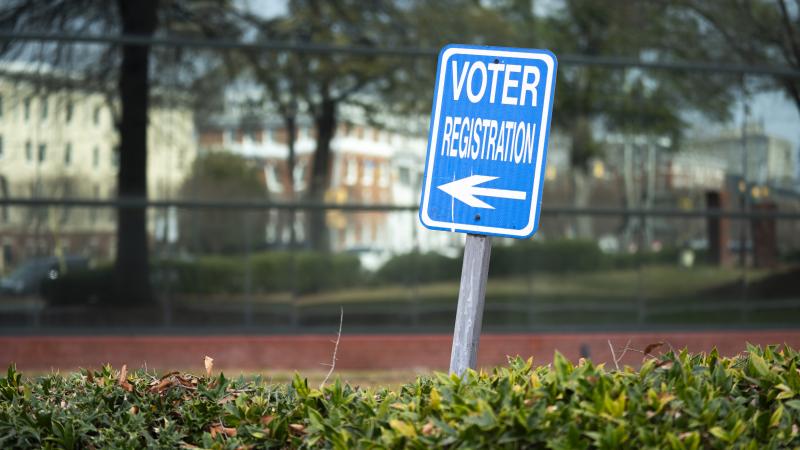Lame duck Biden goosed by reams of rulings reining in his regs, constraining a Democratic successor
Even before the Supreme Court ended judicial deference to agency interpretations of their own regulations, judges were kneecapping a wide swath of President Biden's expansive agenda that circumvented Congress.
Shortly before he became a lame duck – exactly how is still disputed – President Biden reportedly called for term limits on Supreme Court justices following a string of decisions he disliked, particularly immunity from prosecution for official acts by his Republican predecessor and current GOP nominee Donald Trump, who denounced the proposal.
The Democratic legislation raises serious questions about separation of powers under the U.S. Constitution that the high court itself would have to review, George Washington University law professor Jonathan Turley wrote in The Hill newspaper Saturday morning, hours before Biden's bow-out.
"The irony is crushing," Turley wrote. "Faced with calls for him to step aside due to his own cognitive decline, Biden is seeking to win reelection by pushing aside justices who are clearly more mentally fit for their own positions."
But it's not just the current Supreme Court, with a 6-3 lineup that belies the frequency of cross-ideological alliances, that has stymied the agenda and priorities of Biden and Vice President Kamala Harris or whichever Democrat succeeds the lame duck, assuming the party keeps the White House.
The administrative state, predominantly relied upon by Democratic administrations to achieve objectives stalled in or unlikely to pass Congress, has endured a stunning frequency of court defeats in recent months on issues from education and economy to energy and environment.
Recently Biden's own nominees have frustrated his agenda, including his sole SCOTUS pick Justice Ketanji Brown Jackson, who concurred with five GOP nominees that the Justice Department exceeded the scope of an obstruction law when prosecuting hundreds of defendants who participated in the Jan. 6, 2021, Capitol riot.
The trend was evident even before the high court foreshadowed mass invalidation of regulations by overturning so-called Chevron deference to federal agency interpretations of their statutes and forced the agencies to seek civil penalties against defendants before a jury in real courts, not administrative law judges, who rarely rule against their agencies.
"We believe, and have always believed, the biggest impact of this case would be prospective," a spokesperson for the New Civil Liberties Alliance, who successfully represented fishing companies forced to pay for Commerce Department monitors on their boats, told Just the News, referring to the end of Chevron deference through the Loper Bright ruling.
"That is, we think this decision will cause agencies to avoid issuing aggressive rules that they know will be stymied," he said. "And we think Congress will be prompted to write clearer legislation" now that SCOTUS has told courts they must independently review ambiguous laws.
"Perhaps no administration has gone as far as President Biden’s to found sweeping and intrusive agency dictates on such questionable assertions of agency authority," far further than "either of its recent predecessor administrations," House Oversight Committee Chair James Comer, R-Ky., wrote in July 10 letters to the Federal Acquisition Regulatory Council, General Services Administration and Office of Personnel Management.
"Many of these rules," such as those related to ESG agendas, "have been based on aggressive interpretations of statutes enacted by Congress years and even decades ago," Comer said, asking for the three entities' "interpretations of their statutory authority to provide congressional oversight of compliance" with the Loper Bright ruling.
Comer and other committee chairs sent similar letters to more than two dozen other agencies.
Alaska Natives are now using the end of judicial deference to agency interpretations to challenge the Bureau of Land Management and Interior Secretary Deb Haaland's decision to shut down oil and gas development that benefits their communities in northern Alaska, arguing it violates congressional intent in the National Petroleum Reserve.
A Louisiana federal judge didn't have to invoke the overruling of Chevron deference days earlier to issue a scathing ruling this month against Biden himself and the Department of Energy for pausing exports of liquified natural gas to countries without free trade agreements.
U.S. District Judge James Cain said it violated the Administrative Procedure Act, "is completely without reason or logic and is perhaps the epiphany of ideocracy," meaning rule by ideology.
The departments of Education and Health and Human Services quickly followed Commerce as victims of the end of Chevron deference, with judges issuing both explicit and functionally nationwide injunctions against regulations that add gender identity to Title IX and to an Affordable Care Act provision that incorporates the sex-discrimination law.
Several GOP-led states and a pediatrician group sued HHS this month to block its interpretation of ACA Section 1557 as covering gender identity, forcing doctors to at least refer patients for so-called gender affirming care and states to pay for "these dangerous procedures," or else faces "huge financial penalties" and exclusion from federal healthcare funding.
Four district judges have blocked the education regulation that was set to take effect Aug. 1. Two federal appeals courts have upheld injunctions as of Monday, with Biden nominees joining Republican nominees in questioning the unilateral redefinition of "sex" in Title IX, which also has implications for the First Amendment rights of students and educators.
The agency's student-loan programs have been a recurring target of federal courts.
Kansas and Missouri judges blocked repayment plans that cancel debts under $12,000 after 10 years and add a year of repayment for every $1,000 over that ceiling, and the 8th U.S. Circuit Court of Appeals finished off the remnants of the Saving on a Valuable Education plan last week nationwide, shortly after the 10th Circuit lifted one injunction.
U.S. District Judge Matthew Kacsmaryk, in Texas, issued a nationwide injunction against the Department of Agriculture last week from using race and gender preferences in the distribution of disaster relief. Last month he blocked an ATF regulation in four states that expands gun background checks to even personal collections, saying it violates the APA.
Also in June, a Mississippi federal judge blocked an Equal Employment Opportunity Commission rule in the Magnolia State and in Alabama that would force them to provide abortion-related accommodations to workers under a law for pregnant workers.
Back in May, a Texas federal judge blocked a Consumer Financial Protection Bureau regulation limiting late fees on credit cards to $8 on the basis that the controlling 5th Circuit ruled that CFPB's funding structure is unconstitutional, which SCOTUS is now reviewing.
The 5th Circuit even overruled Judge Mark Pittman's subsequent attempt to transfer the case to D.C. federal court, rebuking him for "abuse of discretion" and rebutting the government's claim that plaintiff banks were "forum-shopping" in a friendly jurisdiction. The opinion by Judge Don Willett said the case has national implications, making a transfer pointless.
The Facts Inside Our Reporter's Notebook
Links
- President Biden reportedly called for term limits
- immunity from prosecution for official acts
- Donald Trump, who denounced the proposal
- Democratic legislation
- The Hill
- cross-ideological alliances
- Justice Department exceeded the scope of an obstruction law
- overturning so-called Chevron deference
- before a jury in real courts, not administrative law judges
- House Oversight Committee Chair James Comer, R-Ky., wrote in July 10 letters
- Comer and other committee chairs sent similar letters
- challenge the Bureau of Land Management and Interior Secretary Deb Haaland's decision
- scathing ruling this month against Biden himself
- regulations that add gender identity to Title IX
- Affordable Care Act provision that incorporates
- Several GOP-led states and a pediatrician group sued HHS
- Two federal appeals courts have upheld injunctions
- Kansas and Missouri judges blocked repayment plans
- 8th U.S. Circuit Court of Appeals finished off the remnants
- nationwide injunction against the U.S. Department of Agriculture
- he blocked an ATF regulation in four states
- blocked an Equal Employment Opportunity Commission rule
- Texas federal judge blocked a Consumer Financial Protection Bureau regulation
- 5th Circuit even overruled Judge Mark Pittman's subsequent attempt














